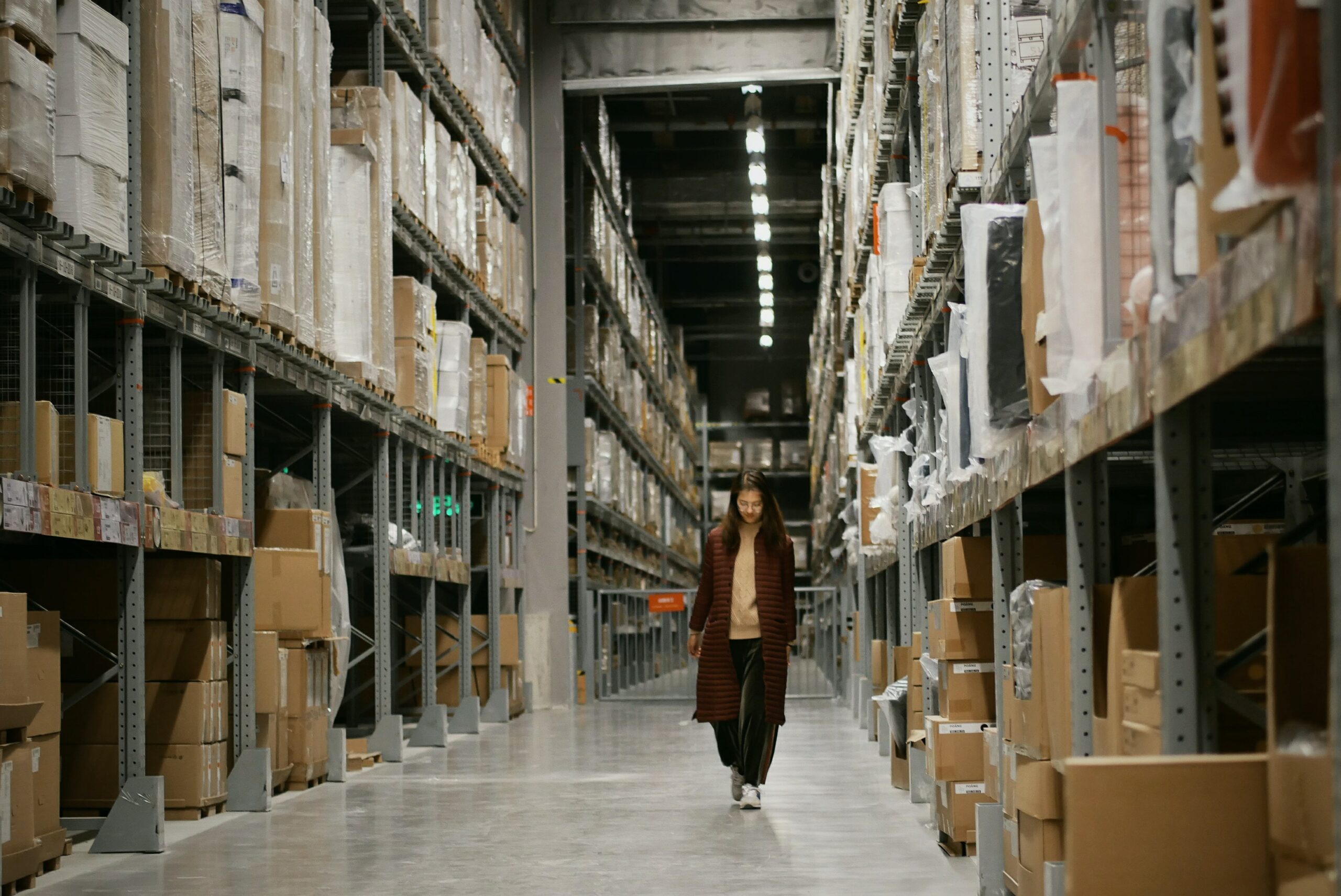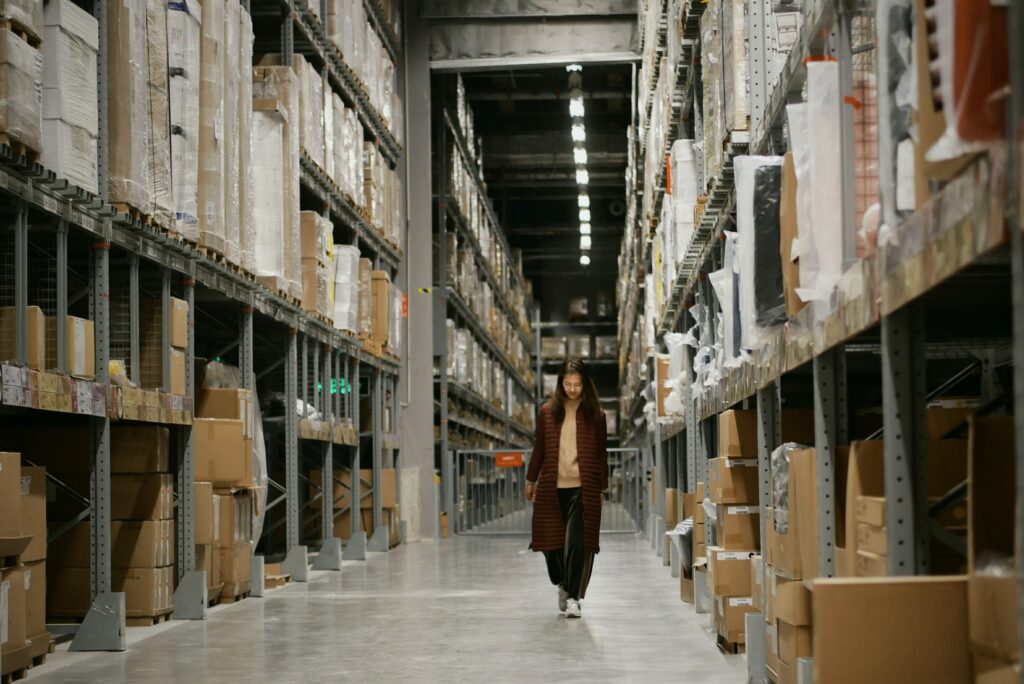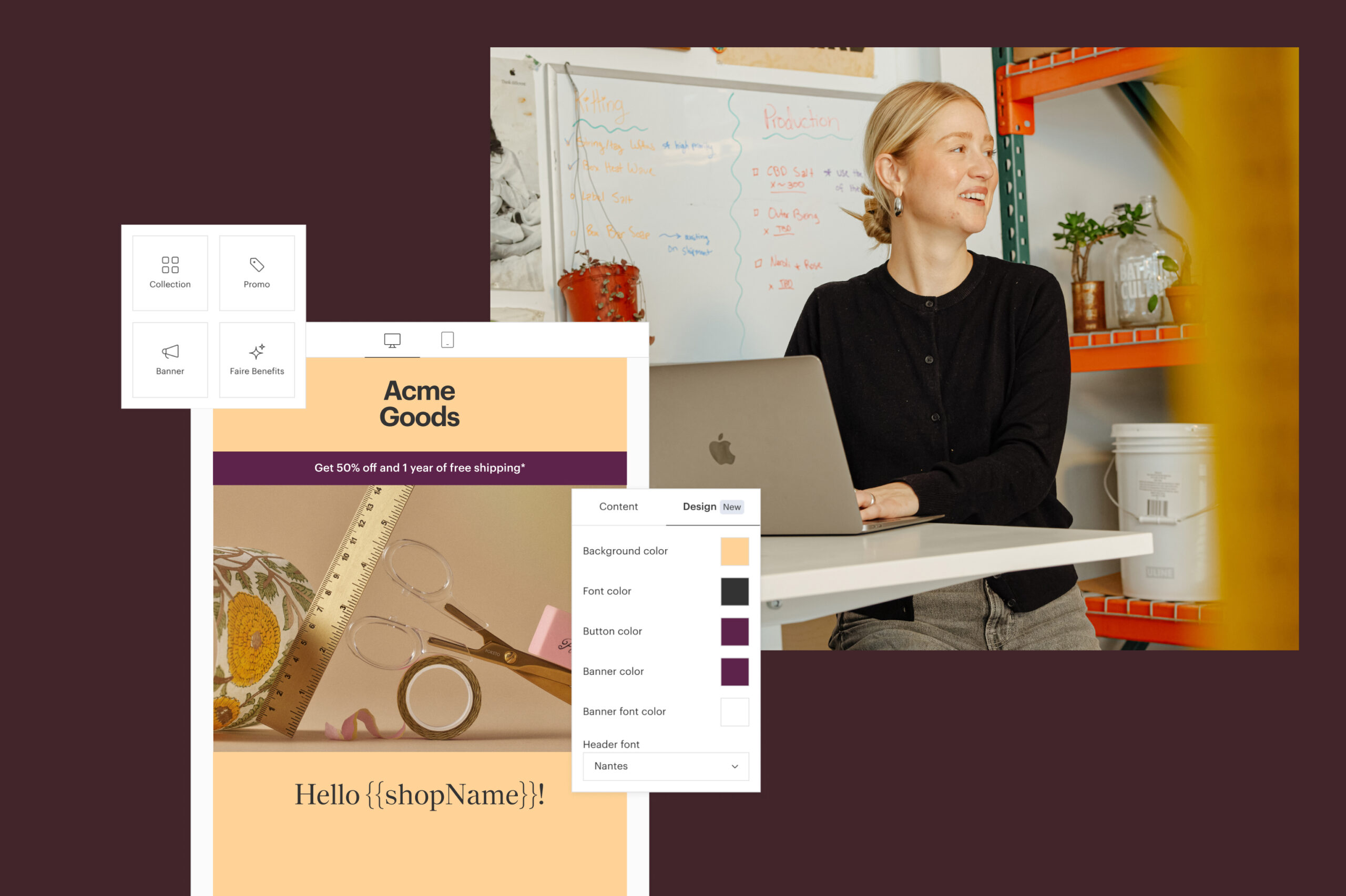

E-commerce logistics is the glue that holds an online business together. Recent trends in e-commerce delivery and e-commerce fulfilment epitomise today’s market shift towards conceptually borderless global brands; retailers expect quality items from all over the world, deftly packaged, in a matter of days. That’s some pressure.
Today, every size of online wholesaler is expected to meet this e-logistics high standard watermark whilst tackling challenges from every direction; such as increasing energy and transport costs on already squeezed budgets, the post-Brexit trade landscape, as well as the ever-changing wider geopolitical situation. All this, whilst striving to deliver true environmental sustainability – a tall order for any e-commerce business.
In this deep dive into B2B e-commerce logistics, we’ll snapshot where e-logistics is today and how we got here, as well as common e-commerce delivery challenges and how to mitigate against them effectively. Finishing up with expert e-commerce fulfilment insight, solutions, and tips that have been proven to work for small businesses just like you. With Faire behind you in this competitive and fast-paced e-commerce logistics landscape, you’re ready to deliver success – and practically perfect parcels, right on time. In this post, we’ll cover:
- What is e-commerce logistics & how has it evolved?
- What common logistics challenges do e-commerce brands face?
- How does Faire help e-commerce brands with common logistics challenges?
- Creating an e-commerce storefront on Faire
What is e-commerce logistics & how has it evolved?
You probably encounter e-commerce logistics every day managing your brand’s business, from shipping, import and export, warehousing, and a million other things that come under this broad umbrella. In essence, e-commerce logistics is a combination of systems dedicated to order fulfilment, delivery, carrier selection, and inventory management.
However, as you’ll know first hand, e-commerce logistics is a complicated chain of responsibility that places great pressure on wholesale businesses to get things spot on – especially in the more client-facing fulfilment and delivery. Updated systems, processes, and automations can lighten the logistical load but this could all be moot without simply choosing the right delivery carrier, for example.
Faire is here to show you how to use innovation to your advantage without overlooking the basics, to build a seamless workflow. For B2B and wholesale businesses, e-commerce logistics presents potential opportunities and potential pitfalls in abundance. Companies may be a step away from direct-to-customer but these demands can quickly cascade from retailers to wholesalers. If you don’t deliver, they can’t deliver either.
A modern e-commerce overview: from order to delivery
More, more, more. Today retailers have so many options for ordering, fulfilment, and delivery. Large multinationals have upped the ante, especially when it comes to delivery speed. How can smaller wholesale businesses keep up?
More retailers are choosing to order products online
For most wholesale businesses, the days of giant catalogues and paper ordering are long gone. Online ordering offers convenience, automation, and enhanced tracking so retailers are kept in the loop. Following on from years of multiple lockdowns, such online ordering bypasses the potential risk, financial impact, and time consuming costs of travelling to tradeshows and expos.
Brands have multiple options to fulfil e-commerce orders
Competition is fierce in the world of fulfilment. Setups can range from a small, spirited team turning over orders by hand to third-party logistics (3PL), where orders are processed and fulfilled by an external service provider. As wholesalers grow they must decide the best way to scale up distribution logistics to get better outcomes and value for money.
Packaged orders are handed off to one of many carriers
An e-commerce business can make or break on the efficiency of its chosen carrier. Your business address, retail client location, type of inventory, and size of operation will dictate the best solution for your business. New carriers are springing up all the time to capitalise on this growth opportunity, so these options just keep growing.
Carriers transport and deliver e-commerce order
Don’t forget, even with the most efficient carrier, e-commerce logistics is not done in a vacuum. Macro concerns such as infrastructure pressures from transport strikes, public health situations, soaring petrol and energy costs, or supply chain issues can all greatly impact carriers’ delivery efficiency. With the best will in the world you can’t always plan for this, therefore good communication when things get a little bit sticky is essential.
Retailers receive order and delivery updates
With a larger global market for goods, being physically and logistically further away presents a challenge for wholesale brands to keep that personal touch in today’s e-commerce logistics. Bright new technology is filling in these gaps with live parcel tracking via apps, texts, or emails so customers can easily keep up with orders. Some businesses have shot ahead using such technology. This, in turn, has raised expectations in the transparency and efficiency of e-commerce logistics and increased the pressure on wholesale small businesses to keep on keeping up.
What common logistics challenges do e-commerce brands face?
Faire understands e-commerce logistics challenges that businesses face. Ensuring workable shipping costs at scale, the intricacies of cross-border shipping, and embodying the brand throughout the customer journey to name but a few. All presenting different issues, approaches, and solutions to keep overheads down – and clients happy.
Order fulfilment
Staying organised is the essence of order fulfilment, which encompasses receiving, managing, and storing inventory, then getting it picked and packed ready for shipping to the customer. Sounds simple but any e-commerce wholesaler will know from experience that it is a complicated undertaking, with plenty of potential stumbling blocks – sometimes literally.
Order fulfilment solutions will depend on the size of your business. Conversely, very small or very large businesses may well do everything in-house; as they have the capacity to store, pack, and send from one location – whether that’s a shed in the garden or a massive bespoke warehouse. Often, it’s the small to medium-sized businesses that are expanding rapidly who suddenly need to adapt and tackle order fulfilment, now at scale. All the while, taking on the physical responsibility of e-logistics, which can be a hazardous environment with risk to staff members if not done to a high health and safety standard, made that more complicated since the COVID-19 pandemic era.
Find out more information on current UK Health and Safety Executive (HSE) regulations here.
When businesses undertake such sudden expansion, third-party logistics solutions come into their own. They can safely offer businesses an off-site space to store inventory, along with organising picking and packing, shipping, and even returns. All the while tracking everything on internal systems, organised in Stock Keeping Units (SKU) that are alphanumeric codes that pertain to specific product types and variations, as seen on packing slips that go out with orders. Every e-commerce seller will know that keeping such paperwork clear and accurate throughout is essential.
This is a weight off for growing small and medium-sized businesses, however corporate responsibility doesn’t end once a third-party is managing logistics. So making sure all this is completed in a safe, timely, transparent, and ethical manner is utmost to any e-commerce brand. It’s good to know that Faire are experts in third-party logistics, connecting brands to retailers via its bespoke platform, whilst offering its own centralised storage and packaging solutions. Discover more here.
Packaging
When looking into packaging options, think about:
- Weight, size, and shape
- Reliability, robustness, and durability
- Sustainable credentials
- Brand look and feel
- Budget cost-effectiveness
- Supply chain limitations
Delivery and shipping
Currently, shipping is a hot topic in e-commerce logistics and often the most complicated aspect of e-logistics strategy as there have been so many changes in this area in recent times.
Businesses need to consider:
- Cross-border shipping
- Every market is different and trade relationships are different from one country to the next. Keeping across trade ins and outs is vital
- Don’t just rely on your carrier to have it covered, it’s your responsibility
- Find more about EU regulations here
- Find out more about US customs rules and regulations here
- Export restrictions
- It’s a two way street and wholesalers must make sure they understand restrictions on both sides of the import and export process
- Stay across the UK Trade Tariff which outlines export restrictions out of the UK
- Brexit knock-on effects
- Since 2020, the gradual process of de-entwining the UK from the EU has meant some confusion and blockages in import and export throughout the region
- Some protocols are in transition whilst EU rules are still in place in the UK and the UK transitions out of the EU. Faire is supporting EU wholesalers and retailers through this complicated process as it expands through Europe
- Keep an eye on government communiques and current affairs so you can prepare for the e-logistical impact of further shifts away from the EU
Read more in our cross-border shipping guide here.
Returns
Returns can be a time-consuming process, which can seem like a pointless drain on budgets with little to show for it. Communication is key.
Thing to keep in mind:
- It’s important to set tangible boundaries, for example a specific returns window that is clearly expressed to the customer through your website and on any remittance
- Ensure you clearly communicate returns processing timescales, with wiggle room for any potential e-logistics delays
- Consider what form of sales and return might work best for retailer from a self-protecting starting point, as trust builds options can evolve with time
- Remember, returns are also an opportunity for upselling and relationship building, if handled correctly
It’s good to know that Faire offers and accepts returns on behalf of brands just like yours. Find out more about how we manage returns here.
Fees
Be aware fully of what you need to know, when it comes to importing and exporting fees. The last thing you want is a client footing the bill for a needless mistake from your side. Fortunately, Faire manages shipping costs, duties, and taxes as part of their service for brands.
Remember:
- International orders are sometimes subject to custom fees on arrival, make sure your shipping carrier is across this
- Importing and exporting in and out of the UK can only happen with the correct custom clearance paperwork, such as the correct commodity codes
- As well as import fees, certain goods imported into the UK are subject Value Added Tax (VAT), which in 2022 is set at 20%
Find out more about the UK import and export process here.
How can brands mitigate these logistics challenges?
Global supply chain issues arising from COVID-19 have left world markets in flux and it looks set to continue. Therefore getting ahead of challenges is essential for a successful e-commerce outfit. Faire can help wholesalers and retailers manage e-commerce logistics in a changing world and be ready to respond to the next potential curveball.
Invest in high-quality packaging technology and materials
Simply receiving Items on time isn’t always enough these days, if you look on YouTube and TikTok the unboxing experience is a whole industry in itself. Such expectations filter through to customers and retailers who want high-quality packaging with character, whilst being both sustainable and beautiful.
Keep it classy. Cheap options and corner cutting might be appealing in the short term, as budgets continue to feel the pinch. However, this quick fix fallacy is outweighed by the potential long-term gains in high-quality messaging that decent packaging and materials brings the customer. Often natural unbleached materials or ingeniously simple but effective packaging design can tick all the boxes. Go for those low-key magical touches that don’t end up zooming through budgets.
Find out more in our deep dive into eco-friendly packaging here.
Plan accordingly for regional and global destinations
Any business will need to adapt their e-commerce fulfilment strategy depending on whether they are getting stock to the other side of the world or round the corner. Making your e-commerce truly global will require forward planning, realistic timelines, and top-notch communication at every stage to stay on top of this complicated process.
Fulfilling locally within the UK will mean quicker turnaround but also higher expectations of a quicksmart service. In some ways, fulfilment has become so efficient in recent years that sending items to Europe is not seen much differently. The shared geographical region and high levels of tech savviness means that both UK and European markets are on the ball and customers have high expectations. Therefore up-to-the-minute planning with the right technology in place is vital to deliver in these advanced markets.
Find out more about selling internationally with Faire here.
Familiarise yourself with carrier costs and timelines
You’re only as good as your latest on-time delivery. Choose the right carrier for the right destination, keep it local where you can as often the greatest market understanding will come from the carriers based there. However, the international big hitters can offer irresistible margins so it’s always worth exploring options on a case-by-case basis, where possible.
When planning, always work backwards from the expected delivery date to create realistic timelines. Pie in the sky deadlines will not help anyone, so be honest about what can be achieved and continue to communicate with clients and carriers throughout. Know your supply chain, your carrier point of contact, and keep meticulous records so you are ready to troubleshoot if an issue occurs.
How does Faire help e-commerce brands with common logistics challenges?
As we’ve seen, e-commerce logistics is a complicated process full of challenges to overcome. Fortunately, Faire is with you every step of the way to handle e-commerce logistics admin, fulfilment, and delivery. You can relax in the knowledge that it’s all under control.
Integrate your e-commerce software with Faire
Software integration isn’t just a nice to have today, it’s essential in modern e-commerce logistics. Fortunately, the Faire platform can sync up with a selection of useful e-commerce partners that cover accounting, invoicing, inventory management, ERP, and e-commerce. Faire’s software integrations can increase efficiency, automate processes to save precious time, live update clients’ on fulfilment and delivery, as well as analyse sales and monitor trends. So you can know exactly where your business is at, in milliseconds.
Discover more about Faire software integrations here.
Easily fulfil orders and create invoices
Faire has developed a global fulfilment programme that will make sure parcels make it to the right place all over the world. This is expanding all the time, for example in the US and Canada, the Faire Invoicing Tool offers invoicing options via the Faire portal and will be expanding into the UK and Europe soon.
Learn more about Faire fulfilment here.
Custom shipping labels and packing slips
Make your brand uniqueness shine through with Faire’s customised shipping label and packing slips. Options include product images, bespoke SKU layout and brand logo.
Learn more here.
Returns are handled by Faire
Faire handles all returns. A massive weight off the shoulders of any B2B or wholesale company, saving money, and time.
See how Faire returns work here.
Create an e-commerce storefront on Faire
E-commerce logistics can be tricky to navigate at the best of times. However, the unexpectedly rapid change of recent years has supercharged the evolution of e-commerce. Changing human behaviour, technological advancements, and increased connectivity have made e-commerce logistics the new frontier. Now is not the time to get left behind.
Faire keeps e-commerce logistics global, yet centralised, and surprisingly simple.
Discover how to superpower your business by selling on Faire today.




